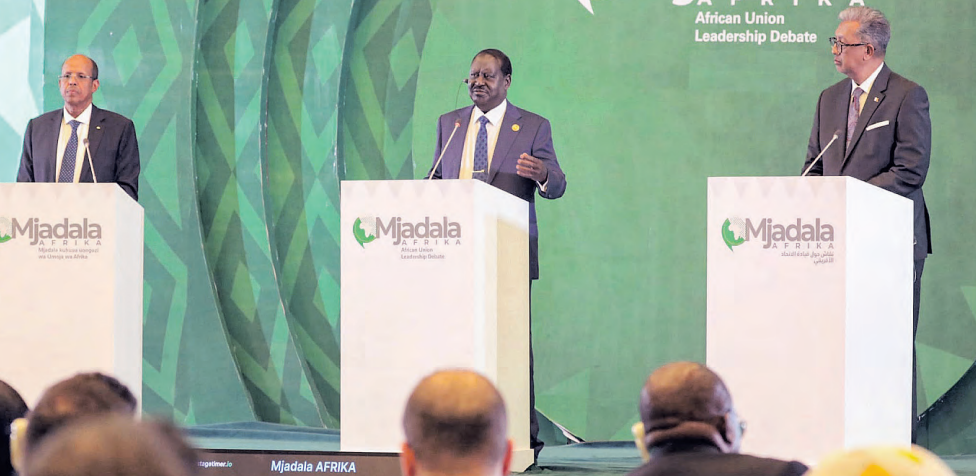
AU reveals poll dates, AUC pre-election guidelines
The election will be held on February 15-16 in three rounds.
The elections come at a critical point for Africa in terms of development.
In Summary

Audio By Vocalize

Next month, the Assembly of Heads of State and Government of the African Union will elect the chairperson and deputy chairperson to steer the AU Commission for the next four years.
This time, Kenya’s former Prime Minister Raila Odinga will face off with Mahmoud Ali Youssouf of Djibouti and Madagascar’s Richard Randriamandrato for the AUC chairperson post.
The elections come at a critical point for Africa in terms of development. Home to over 1.2 billion people, Africa remains one of the most underdeveloped regions of the world.
Nearly half of the population still live in absolute poverty. Debilitating conflicts are raging in many countries and territories in Africa, displacing millions of people while destroying the nascent productive sectors.
Recent eruptions in the Eastern Democratic Republic of Congo and the festering Sudan crisis are cases in point. It is not enough that Africa’s position in the global governance structures remains that of aid recipients with muted agency.
Yet, Africa is also the most promising region - with a young and dynamic population, most arable land and abundant natural resources. The challenge for Africa largely remains that of governance.
How to get African countries to champion rule-based, people-centred, innovative and sustainable governance frameworks, is the question undergirding socio-economic transformation of the continent.
Although much of the work demands that Africa looks inward for inspiration and action, the continent also has external exemplars that could inform its reorientation to a more peaceful, prosperous and globally competitive status.
One of the key development partners that the new AUC leadership should prioritise is China. Beijing ticks many boxes as an example and pragmatic actor on the world stage today.
China is the largest consumer market in the world and the strongest source of new technologies, as recently exemplified by the emergence of Chinese artificial intelligence company, Deepseek.
Beijing is also a leading source of foreign direct investment and development projects financing for Africa. The starting point would be to benchmark on China’s remarkable governance success.
In just three decades, China broke the yokes of colonialism and championed endogenous economic and political systems that have seen over 800 million people lifted out of poverty.
While African countries don’t need to copy China, the experience is a narrative that could catalyse the continent’s own socio economic transformation.
Both sides should engage in policy dialogues and share best practices in governance and public administration. This can help improve institutional capacity and governance structures in Africa for the benefit of the citizens.
The second area is in joint investments in productive sectors. Africa is a business case. The continent has human capital and natural resources which are critical ingredients in the industrialisation discourse.
On the other hand, China is home to technologies that can hasten infrastructure modernisation, including renewable energy sources. Hoisting an innovation ecosystem that effectively brings together academia (universities), industry (businesses) and government is key in Africa’s search for sustainable development.
Thirdly, is the area of human capacity building. Africa needs its youth properly skilled to drive its development. Traditional knowledge hubs in Europe and North America remained attractive to African youth for a long time. The downside is that such centres also promoted brain drain – taking away Africa’s most talented and most energetic.
Today, there exist pathways that allow Africans to train in China and return to develop Africa. This should be strengthened. Fourth, is securing the market for Africa’s produce and services. China has expanded access to its market for African produce, the only condition being diplomatic relations.
This is unique in the current world, where some partners are putting up tariffs and other conditionalities on trade. The new AUC leadership should ensure better utilisation of the Chinese market to create value and wealth for Africa at farm and firm levels.
The fifth is to synergise their voices in confronting global challenges. With a collective population above 2.8 billion people, voices of China and Africa should impact global conversations on key issues such as climate change, development inequality, resolution of political conflicts and reengineering of global institutions of governance to make them more responsive to the aspirations of developing countries.
Such consultations reduce margin for conflict, enhance understanding, friendship and joint prosperity.
DR ADHERE
CAVINCE is a scholar of
international
relations with a
focus on ChinaAfrica development
cooperation

The election will be held on February 15-16 in three rounds.